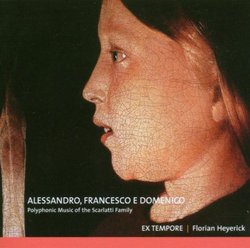| All Artists: Ex Tempore Title: Alessandro, Francesco and Domenico Scarlatti : Polyphonic Music of the Scarlatti Family Members Wishing: 0 Total Copies: 0 Label: Etcetera Original Release Date: 1/1/2006 Re-Release Date: 7/25/2006 Album Type: Import Genre: Classical Style: Opera & Classical Vocal Number of Discs: 1 SwapaCD Credits: 1 UPC: 8711801101156 |
Search - Ex Tempore :: Alessandro, Francesco and Domenico Scarlatti : Polyphonic Music of the Scarlatti Family
 | Ex Tempore Alessandro, Francesco and Domenico Scarlatti : Polyphonic Music of the Scarlatti Family Genre: Classical
The father of the Neapolitan School, Alessandro Scarlatti, was the first in a great family of Sicilian musicians. His Salve Regina is part of a collection of 10 sacred concerts.The concerts exhibit perfect Apollonian poise... more » |
Larger Image |
CD Details
Synopsis
Product Description
The father of the Neapolitan School, Alessandro Scarlatti, was the first in a great family of Sicilian musicians. His Salve Regina is part of a collection of 10 sacred concerts.The concerts exhibit perfect Apollonian poise between expression and art, successfully avoiding superficial effects. The sacred music of his son, Domenico Scarlatti, is unquestionably of the first rank. The Missa Quatuor Vocum is written in pure imitation of the dignified polyphonic style of the Renaissance, with subtle baroque elements. The Magnificat is predominantly polyphonic, but for reasons of textual expressiveness the composer has also employed some more baroque elements. Less known is the brother of Alessandro, Francesco. He, too, worked in Palermo, Rome and Naples. The Miserere in G in monumental Roman tradition shows Francesco to be a clever and inspired musical craftsman, typically Italian in spirit: well-structured harmonies, an arbitrary modelling of melodic lines, alternating with short and concertante fugato parts of strong southern vitality. Ex Tempore concentrates on a stylistically clear and musically captivating approach to Early, Romantic and Modern vocal music. The variable size of the ensemble allows it to be optimally adapted to any programme with music between 1600 and 1900. In its original choice of programmes and its highly qualitative interpretations the ensemble makes an important contribution to the expansion and renewal of the vocal repertoire. Florian Heyerick (1958) studied in Ghent, Brussels and Leuven and won first prizes for recorder, flute and chamber music. His efficient and fresh approach, his stylistic insight into a whole range of periods and his pursuit of the professionalisation of choral singing are much appreciated by many musicians and organisers. He specialised in conducting orchestras in the baroque, classical and early romantic repertoire, while bringing the new stilistic ideas and historical art of playing and interpretation.

 Track Listings (22) - Disc #1
Track Listings (22) - Disc #1